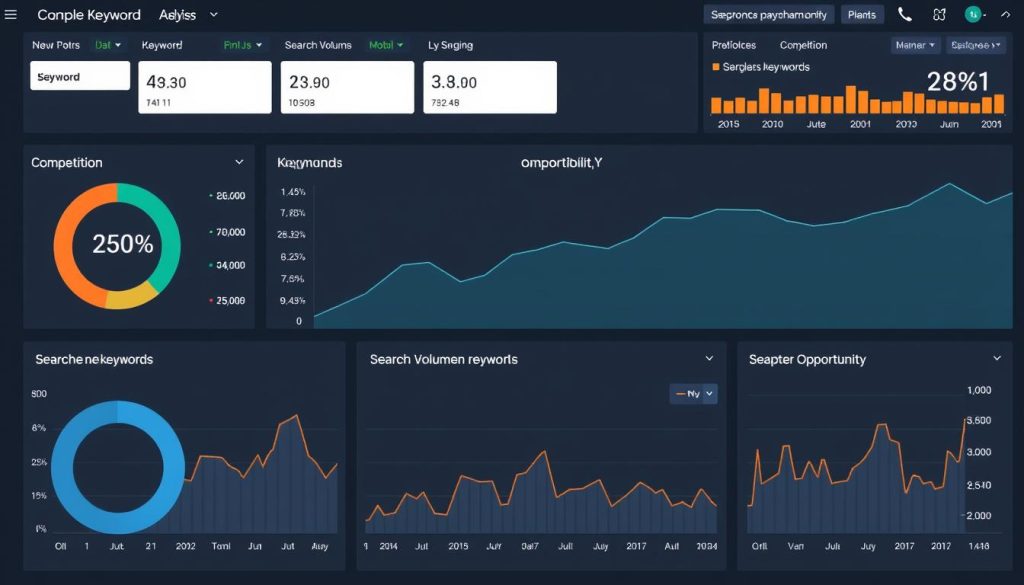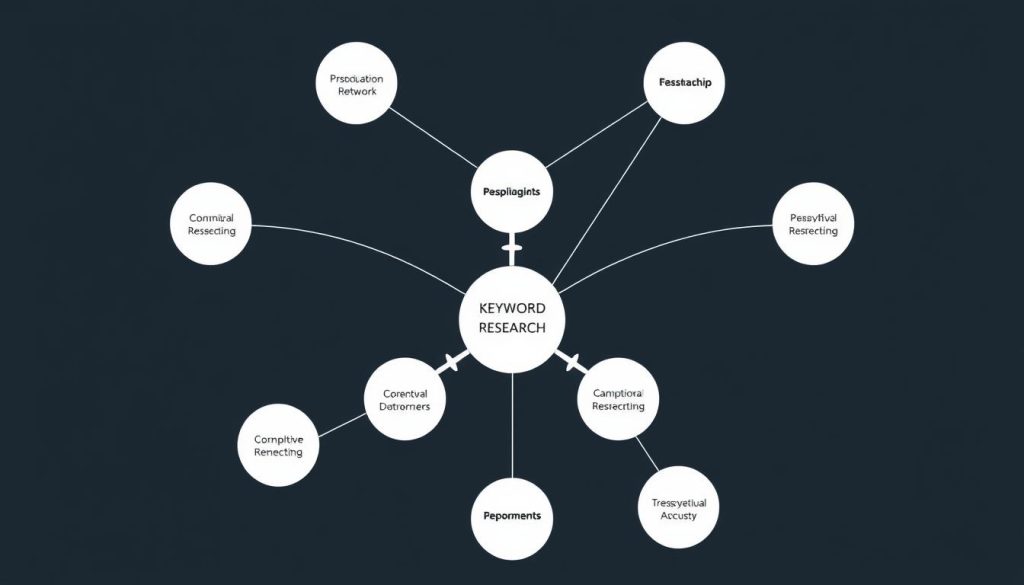Keyword research is key to online success. It helps us find the most relevant and high-traffic SEO keywords. This boosts our online presence and drives more conversions. It’s a vital part of SEO, helping us understand our audience and create content they’ll love.
We aim to give you a detailed guide on mastering keyword research. We’ll cover the basics, essential tools, and strategies for a winning keyword research plan. Our focus will be on the most effective SEO keywords.
Key Takeaways
- Keyword research is essential for understanding our target audience and creating relevant content.
- Conducting thorough keyword research helps identify high-traffic SEO keywords.
- Keyword research is a critical part of search engine optimization (SEO).
- Creating a successful keyword research plan increases online visibility and drives conversions.
- Using the right SEO keywords is vital for achieving online success.
Understanding the Foundations of Keyword Research
Exploring keyword research reveals the vital role of keywords in SEO. Keywords are the terms people use to find information online. They help search engines grasp your website’s content and relevance. Through detailed keyword analysis, we lay a strong base for our keyword strategy.
Our keyword research method focuses on understanding our audience’s motivations and goals. Search intent is key here, revealing the reasons behind a user’s search. By examining search intent, we craft a keyword strategy that meets our audience’s needs.
What Makes Keywords Important for SEO
Keywords are essential for any effective SEO campaign. They enable search engines to grasp your content’s context and relevance. A well-thought-out keyword strategy boosts your online presence, drives more traffic, and increases conversions.
The Role of Search Intent in Keyword Selection
Search intent is vital in choosing keywords. It uncovers our audience’s motivations and goals, guiding us to create relevant content. By analyzing search intent, we pinpoint the most fitting keywords, improving our SERP rankings.
Types of Keywords You Need to Know
There are various keyword types, including short-tail and long-tail keywords. Short-tail keywords are broad, while long-tail keywords are specific. Mixing both in our strategy enhances our online visibility and attracts more targeted traffic.
Essential Tools for Effective Keyword Research
Having the right tools for keyword research is critical. A keyword planner is essential for identifying and analyzing keywords. It offers insights into search volume, competition, and cost-per-click. This helps us refine our keyword research and develop a more focused strategy.
Tools like Ahrefs and SEMrush provide advanced features for keyword research. They help streamline the process, saving us time and boosting our SEO performance. Key benefits include:
- Identifying relevant keywords and phrases
- Analyzing search volume and competition
- Refining keyword lists and creating targeted strategies
Using these keyword tools helps us understand our audience better. It enables us to create content that meets their needs. As we refine our keyword research strategy, the right tools are vital for online success.
Creating Your Keyword Research Strategy
Developing a successful online presence requires a well-thought-out keyword research strategy. This process involves several key steps. These include setting clear research goals, identifying your target audience, and establishing your keyword categories. By focusing on these areas, your keyword research will align with your marketing objectives, driving meaningful results.
Our keyword research approach involves careful consideration of your business needs and goals. We understand that every organization is unique, needing a tailored strategy. To create an effective plan, we analyze your target audience, industry trends, and competitor activity. This helps us identify the most relevant SEO keywords for your success online.
Some key aspects of our keyword research strategy include:
- Conducting thorough keyword research to identify relevant terms and phrases
- Analyzing search volume and competition to determine the most valuable keywords
- Establishing a clear understanding of your target audience and their search behaviors
By following this structured approach, we help you create a keyword research strategy that drives real results.
| Keyword Research Step | Description |
|---|---|
| Research Goals | Define clear research objectives and outcomes |
| Target Audience | Identify and understand your target audience’s needs and preferences |
| Keyword Categories | Establish relevant keyword categories and themes |
How to Conduct In-Depth Keyword Analysis
Conducting in-depth keyword analysis is a critical step in creating a successful keyword research strategy. It helps us understand the popularity of our target keywords and identify opportunities for growth. We refine our keyword strategy by evaluating keyword difficulty, which assesses competition and determines ranking feasibility.
When conducting keyword analysis, we consider several factors. These include search volume, keyword difficulty, and commercial intent. By analyzing these, we can create a more targeted and effective keyword strategy. For instance, we use tools like Google Keyword Planner to analyze search volume and identify keywords with high commercial intent.
Our keyword strategy is also informed by an evaluation of keyword difficulty. This involves assessing the competition for our target keywords and determining the feasibility of ranking for them. By evaluating keyword difficulty, we can refine our keyword strategy and focus on keywords that are more likely to drive traffic and conversions.
Some key considerations for conducting in-depth keyword analysis include:
- Analyzing search volume to understand the popularity of target keywords
- Evaluating keyword difficulty to assess the competition and determine the feasibility of ranking
- Assessing commercial intent to understand the motivations and goals of the target audience
By conducting thorough keyword analysis and refining our keyword strategy, we can create a more targeted and effective approach to keyword research. This involves using keyword analysis to inform our content creation and optimization efforts. We continually evaluate and refine our keyword strategy to ensure it remains effective.
| Keyword Analysis Factor | Importance |
|---|---|
| Search Volume | High |
| Keyword Difficulty | Medium |
| Commercial Intent | High |
Leveraging Long-Tail Keywords for Maximum Impact
We grasp the critical role of long-tail keywords in steering targeted traffic to our site and boosting SEO. By integrating these keywords into our keyword research, we adopt a more refined and focused SEO strategy. This strategy helps us diminish competition, elevate conversion rates, and craft content that deeply resonates with our audience.
Employing long-tail keywords enables us to pinpoint our content more accurately and compete less fiercely than with short-tail keywords. This makes them more attainable for ranking and more potent in attracting targeted traffic. The advantages of long-tail keywords include:
- Increased conversion rates
- Reduced competition
- More targeted traffic
By harnessing long-tail keywords, we forge content that resonates with our audience, boosting our online presence. This strategy allows us to engage with our audience more intimately, raising the likelihood of conversion and driving business expansion.
Long-tail keywords are a powerful tool in our SEO arsenal, allowing us to target specific search queries and create content that meets the needs of our target audience.
Advanced Competitive Keyword Analysis Techniques
To maintain a competitive edge in search engine rankings, we employ advanced keyword analysis. This method helps us spot gaps in our competitors’ strategies. Utilizing keyword tools, we dissect competitor keyword gaps, uncover hidden opportunities, and monitor their performance. This enables us to craft content that addresses these gaps, attracting targeted traffic to our site.
Our competitive keyword analysis process involves several critical steps:
- Analyzing competitor keyword gaps to identify areas where they are weak
- Finding untapped keyword opportunities that our competitors have not targeted
- Tracking competitor keyword performance to understand their strengths and weaknesses
Through competitive keyword analysis, we enhance our SEO performance. We leverage keyword tools to dissect our competitors’ strategies, pinpointing areas for enhancement. This strategy refines our keyword research, boosting targeted traffic to our website.

- Identifying new keyword opportunities
- Improving our search engine rankings
- Increasing targeted traffic to our website
Integrating competitive keyword analysis into our strategy keeps us ahead of competitors. We employ keyword tools to analyze competitors’ strategies, identifying areas for improvement. This approach refines our keyword research, driving more targeted traffic to our site.
Implementing Your Keyword Research Findings
We’ve reached the end of our keyword research journey, where we apply our findings. We now understand our audience, their search intent, and the keywords that will propel us online. It’s time to craft content that resonates with our audience and enhances our search engine rankings.
Our keyword research strategy is the foundation of our content creation. We leverage the insights from our research to create compelling content that meets our audience’s needs. By incorporating relevant SEO keywords, we boost our visibility and attract more targeted traffic to our site.
To maximize our keyword research strategy’s effectiveness, we must regularly monitor its performance. This involves tracking our search engine rankings, analyzing website traffic, and adjusting our strategy as needed. By refining our keyword research and content creation, we can meet our marketing goals.
Creating Content Based on Keyword Data
- Conduct thorough keyword research to identify relevant SEO keywords
- Develop a content calendar that incorporates our target keywords
- Craft high-quality, engaging content that addresses the needs of our audience
Monitoring Keyword Performance
Tracking our keyword performance helps us identify areas for improvement and adjust our strategy. We analyze our search engine rankings, website traffic, and conversion rates to gauge the success of our keyword research strategy.
| Keyword | Search Volume | Conversion Rate |
|---|---|---|
| Keyword Research | 1000 | 5% |
| SEO Keywords | 500 | 3% |
By implementing our keyword research findings, we can develop a more effective SEO strategy. This strategy drives real results. Stay updated with the latest trends and best practices in keyword research to ensure ongoing success.
Common Keyword Research Mistakes to Avoid
When conducting keyword analysis, it’s vital to steer clear of common pitfalls. These can harm your online presence. A well-thought-out keyword strategy is key to attracting the right traffic and boosting your search rankings.
Some common errors to sidestep include:
- Choosing the wrong keywords, which can result in content that’s off-target and lower conversion rates.
- Overlooking search intent, leading to content that doesn’t meet user needs and less engagement.
- Not monitoring keyword performance, making it hard to gauge your keyword strategy‘s success and pinpoint areas for betterment.
Avoiding these pitfalls and doing thorough keyword analysis can help craft a more effective keyword strategy. This strategy should drive tangible outcomes. Always keep your strategy updated to stay on track with your online objectives.

By knowing these common errors and taking steps to dodge them, you can enhance your online footprint. This increases your success prospects in the fiercely competitive digital arena.
| Mistake | Consequence | Solution |
|---|---|---|
| Targeting the wrong keywords | Reduced conversion rates | Conduct thorough keyword research |
| Ignoring search intent | Poor content creation | Analyze search intent and create relevant content |
| Failing to track keyword performance | Difficulty understanding strategy effectiveness | Regularly track and refine your keyword strategy |
Future-Proofing Your Keyword Strategy
To stay ahead in the ever-evolving landscape of search engine optimization, adapting our keyword research strategy is essential. We must continuously monitor search engine updates and adjust our approach. This ensures our keyword research remains effective and targeted, driving more traffic to our website.
Exploring voice search optimization, we must consider the nuances of conversational search queries. We need to create content optimized for natural-sounding voice searches. These often differ from traditional text-based searches. By incorporating AI and machine learning trends, we can refine our content creation efforts and improve our online presence.
- Staying up-to-date with the latest search engine updates and algorithm changes
- Preparing for voice search optimization by creating conversational content
- Incorporating AI and machine learning trends to refine our keyword research and content creation
By focusing on these areas, we can ensure our keyword research strategy remains effective. It drives targeted traffic to our website, ultimately boosting our online success through strategic keyword research and SEO keywords.
Conclusion: Transforming Your Online Presence Through Strategic Keyword Research
Mastering keyword research is essential for online success. It allows us to understand the SEO keywords that attract our target audience. This knowledge enables us to create content that meets their needs and preferences.
Keyword research is a continuous effort, not a one-time task. It’s important to stay updated with industry trends, search engine updates, and user behavior changes. Regularly review your keyword categories and adjust your content to keep it relevant and valuable for your audience.
With the strategies and techniques from this guide, you’re equipped to enhance your online presence and achieve sustainable growth. Embrace the power of strategic keyword research. See your website rise in search engine rankings, attract more qualified leads, and deliver outstanding results for your business.


